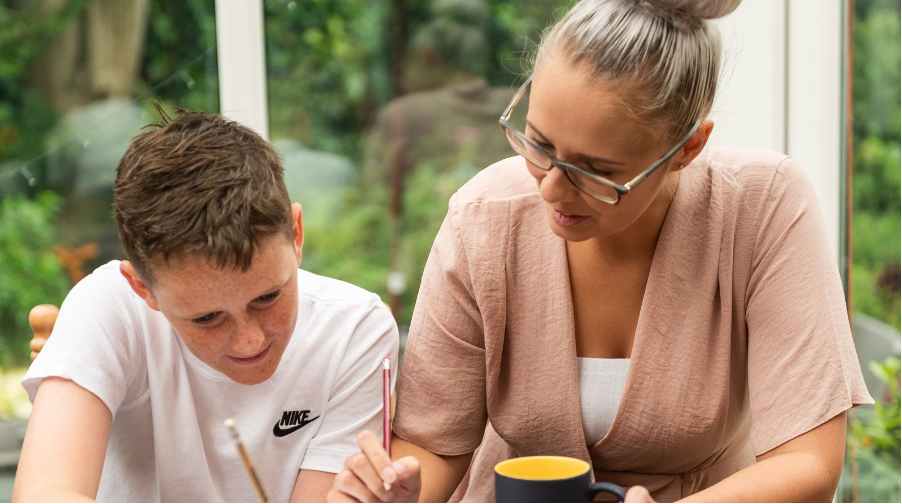
Children in Care and Care Leavers
Young people in foster care and children’s homes should be supported in safe and caring environments.
Still, thousands of children are left without care each year due to supported (semi-independent) and unregistered accommodation.
We believe that every child in care should be guaranteed care up to the age of 18.
That is why we are part of the Keep Caring to 18 Steering Group, chaired by Article 39, and we continue to campaign for the phasing out of supported accommodation and greater attention made to the continued illegal use of unregistered accommodation.
Keep Caring to 18
More than 7,000 teenagers in care in England live in accommodation without day-to-day care, and the number is rising each year. Loving families don’t stop providing care to children from the age of 16, and neither should the care system.
What is ‘supported accommodation’?
Young people in foster care and those in children’s homes should be supported in safe and caring environments. However, under new secondary legislation, 16- and 17-year-olds in or leaving care can now be placed in semi-independent settings such as bedsits, hostels, shared housing with unfamiliar adults, or even caravans. These settings are now recognised by Ofsted as ‘supported accommodation’ despite offering no day-to-day care.
By law, if a child is receiving both care and accommodation, the setting must register with Ofsted as a children’s home. This ensures that the provider meets national standards and adheres to legal safeguards.
However, supported accommodation services are not required to provide care, meaning many of these protections do not apply, and vulnerable young people are left at greater risk.
Campaign background
Following widespread concerns highlighted in BBC Newsnight’s ‘Britain’s Hidden Children’s Homes’ programme, the Department for Education started a public consultation on regulating semi-independent and independent accommodation for children in care and care leavers, which closed in early June 2020.
In September 2020, the Children’s Commissioner for England published a report about children in care living in semi-independent accommodation. This report reiterated the concerns about very vulnerable children being exploited and abused in unregulated accommodation that BBC Newsnight raised.
The Children’s Commissioner recommended that the use of semi-independent and independent provision should be made unlawful for all children in care:
“No child under the age of 18 should be placed in an unregulated setting. All children aged under 18 should receive care rather than support. As such, there should be a requirement that any setting they are placed in is regulated as a children’s home”.
Government bans children-under-15 being placed in supported accommodation
On 19 February 2021, the Government announced that it would only ban semi-independent accommodation for children in care aged 15 and under by September 2021.
However, only 1.5% of children living in supported and independent accommodation are under the age of 16 (90 out of 6,190 children on 31 March 2019), meaning the Government’s proposals left the vast majority of children in this kind of accommodation without care.
Latest Government statistics suggest that up to 50% of children in care aged 16 and 17 lived in care-less accommodation as of March 2024.
During 2021, the Department for Education consulted on national standards for semi-independent accommodation for 16- and 17-year-olds in care, with the intention of them becoming regulated through an “Ofsted-led registration and inspection scheme”.
These new national standards deliberately omitted “care” because establishments which provide children with care and accommodation must register as children’s homes and be inspected by Ofsted.
Judicial Review by Article 39 – Care protections for older children
High Court Says Government Can Treat 16- and 17-Year-Olds in Care Differently (2022)
In March 2022, the High Court decided that the government did not break the law by giving less protection to 16- and 17-year-olds in care.
A children’s rights charity, Article 39, had challenged the new law that came into force in September 2021. Article 39 argued this was unfair and unsafe, but the High Court rejected their case. They were also not allowed to appeal the decision.
Despite this, Article 39 is continuing to campaign for all children in care to receive care until at least age 18 through their #KeepCaringTo18 campaign.
Supported Accommodation Regulation 2023 (England)
In 2023, the Government introduced secondary legislation to define four categories of semi-independent accommodation for children in care aged 16 and 17. These include:
- Accommodation where a young person lives alone
- Shared accommodation with other children in care or care leavers
- Accommodation shared with adults, including those with complex needs (e.g. mental health issues or those leaving prison)
- Accommodation provided in someone’s own home, not regulated under fostering standards
This was the first time standards were introduced for these settings. However, the regulations differ significantly from the protections in place for younger children living in registered children’s homes.
Why supported accommodation falls short
Although modelled loosely on children’s home regulations, the new standards for semi-independent accommodation exclude several key safeguards:
- There is no requirement to provide day-to-day care
- There is no need for staff or managers to be qualified
- There is no requirement to appoint independent people to monitor the accommodation monthly
- There is no ban on corporal punishment, which has been prohibited in children’s homes since 1990
The omission of crucial safeguards has led many campaigners to refer to these settings as “care-less”.
Lower inspection standards
Under the new framework, Ofsted will only inspect a sample of supported accommodation providers once every three years. Providers will be given two working days’ notice before an inspection.
By contrast, registered children’s homes are inspected at least once a year, without prior notice. The difference in scrutiny is stark, particularly given that private companies run most supported accommodation.
Concerns around mobile and temporary settings
The accompanying statutory guidance allows for the use of mobile or non-permanent settings such as caravans, barges or boats in “very exceptional circumstances”. There is no clear explanation of what qualifies as exceptional, leaving room for misuse.
No daily care
Young people placed in supported accommodation do not receive day-to-day care. If providers were offering this, they would be classed as an unregistered children’s home, which is illegal.
In June 2025, Lord Watson of Invergowrie (Lab) has introduced Amendment 69AB in the Children’s Wellbeing and Schools Bill, proposing a legal duty for local authorities, as corporate parents, to provide care “as a reasonable parent would.”
This aims to close a legal gap highlighted by Article 39’s 2022 judicial review and to clarify local authorities’ responsibility to safeguard each child’s welfare.
Currently, loopholes allow unsafe placements of looked after children. This amendment seeks to prevent such harmful placements and promote safer, properly regulated care environments.
We are now waiting to see if this important amendment will become law.
Who is living in this accommodation?
The accompanying statutory guidance allows for the use of mobile or non-permanent settings such as caravans, barges or boats in “very exceptional circumstances”. There is no clear explanation of what qualifies as exceptional, leaving room for misuse.
What Ofsted is saying
In August 2024, Ofsted’s National Director for Social Care raised concerns that some providers are using terms such as “higher needs support” or “high support” in ways that blur the distinction between support and care. These labels can mislead commissioners and families, potentially masking unlawful practices.
In some cases, this means that providers are operating unregistered children’s homes. These settings are not regulated to provide the care some children with complex needs require. As a result, young people are being denied safe, skilled, and properly supervised care.
Why this matters
The evidence shows that young people with high needs are being placed in settings that are not designed or equipped to provide the care they require. The #KeepCaringTo18 campaign warned this would happen, and now Ofsted confirms it is seeing exactly that.
We believe that every young person in care deserves appropriate care and support until they are at least 18 years old. No child should be placed in accommodation that fails to keep them safe or meet their needs.
We must speak out and call on the Government to #KeepCaringTo18. Will you join us?
What we’re calling for
If a child is being looked after by the state, they should receive care – up to at least 18 years.
- All children need care for their wellbeing and development, and this can be provided alongside respect for growing autonomy.
- Children, young people and care leavers must be at the heart of policy development in this area. This includes those who are currently in secure settings and those who have had extremely difficult experiences in care.
- All forms of accommodation for looked after children must be regulated and inspected.
- The regulation of supported accommodation for looked after children must include a guarantee of care.
The government must provide sufficient financial resources for local authorities to meet their statutory duties to all looked after children.
Steering Group Members
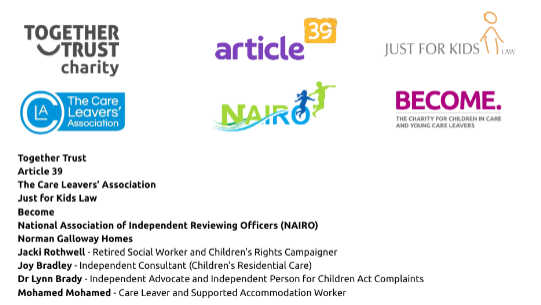
Unregistered accommodation
Our investigation found that over 700 children in England were living in unregistered accommodation between 2020 and 2024, with two-thirds being under 16. Between 2020 and 2023, these illegal settings surged by 277%.
What are ‘unregistered homes’?
Unregistered homes are different from supported accommodation. Unregistered homes are accommodation for children in care that is not registered with Ofsted, which is illegal under the Care Standards Act 2000.
Simply put, any placement for children in care must be registered by law.
Some providers attempt to avoid registration by claiming that they are simply offering ‘support’ rather than ‘care’. This distinction allows settings to operate unofficially and unsafely. But in reality, many of the children placed in these homes often have complex needs and require round-the-clock care.
The use of unregistered accommodation means that some of the UK’s most vulnerable children are living without independent oversight, risking their safety, wellbeing, and development.
Children as young as 12 are often subject to Deprivation of Liberty orders, with round-the-clock supervision by agency staff and minimal therapeutic care. Cuts to local services, delays in mental health and disability support, plus the pandemic and cost-of-living crisis have all increased needs.
Our investigation
In 2023, we submitted Freedom of Information requests to all councils in England to better understand the scale of unregistered children’s homes. This work followed a conversation with journalist Tom Wall, who committed to publishing the findings if our concerns proved valid.
Our investigation confirmed that unregistered placements are widespread, particularly for children under 16. These placements are also highly costly, with over £100 million spent annually. This money could instead support the creation of long-term, high-quality, regulated care.
Our findings featured in The Observer and The Guardian received widespread media attention. The following week, three MPs cited the joint investigation by Together Trust and the Observer during a debate in the House of Commons on children’s social care.
Our 2023 investigation found that over 700 children in England were living in unregistered accommodation between 2020 and 2024, with two-thirds being under 16. Between 2020 and 2023, these illegal settings surged by 277%.
Despite being unlawful under the Care Standards Act 2000, one in five councils have resorted to using unregistered placements amid capacity shortages.
The Children’s Wellbeing and Schools Bill
Introduced in December 2024, the Children’s Wellbeing and Schools Bill sets out new ambitions for both social care and education. The Bill is split into two parts:
- Social care reform, building on the Government’s policy paper Keeping children safe, helping families thrive
- Education reform to support achievement and wellbeing
One of the most critical areas for Together Trust is how the Bill addresses the use of unregistered children’s homes.
For the first time, the Bill aims to give Ofsted new powers to issue financial penalties to providers operating illegally, which is intended to be quicker than prosecuting under existing legislation.
While welcome, this change alone will not solve the problem. Unregistered homes remain unlawful and unregulated. Children placed in these settings are at significant risk.
In our blog, The Emerging Crisis of Unregistered Children’s Homes, we outline the growing use of these placements and the serious dangers they pose.
Our campaign action
As the Bill progresses through Parliament in May 2025, we launched a campaign calling for an end to unregistered accommodation. We encouraged supporters to contact their MPs and demand an immediate ban on these unsafe and unlawful placements for children in care.
On 17 June 2025, Lord Watson used part of the briefing we sent him during the Committee Stage of the Bill to raise our concerns in Parliament.
“While the Bill introduces new enforcement powers and fines for illegal providers, these measures alone are unlikely to drive the systemic change that is urgently needed. Without a national strategy to eliminate these illegal settings, children will remain at serious risk.
This is not only a safeguarding failure but a financial and moral failure. Without a clear commitment from the Government to phase out unregistered provision, children will continue to be placed in these unsafe, inappropriate settings. Wales has already taken steps to end the use of unregistered accommodation. I suggest that there is no justification for England being left behind.”
What we’re calling for
We are urging the Government to take meaningful action by:
- Setting out how the Department for Education, Ofsted, and the Ministry of Justice will work together to end the use of unregistered settings;
- Publishing a national sufficiency and workforce plan to increase the availability of regulated, therapeutic care;
- Guaranteeing regulated care for all children in care up to at least the age of 18, in line with the recommendations of the Independent Review of Children’s Social Care.
Every child in care deserves to feel safe, supported and heard. Together, we strive for a future where all children in care have the safety, support, and opportunities to thrive.
Read our latest campaign updates
-

DfE response to Education Committee’s children’s social care report
Background In December 2023, the Education Committee launched an inquiry into children’s social care in England. Together Trust provided written and oral evidence. In…
-
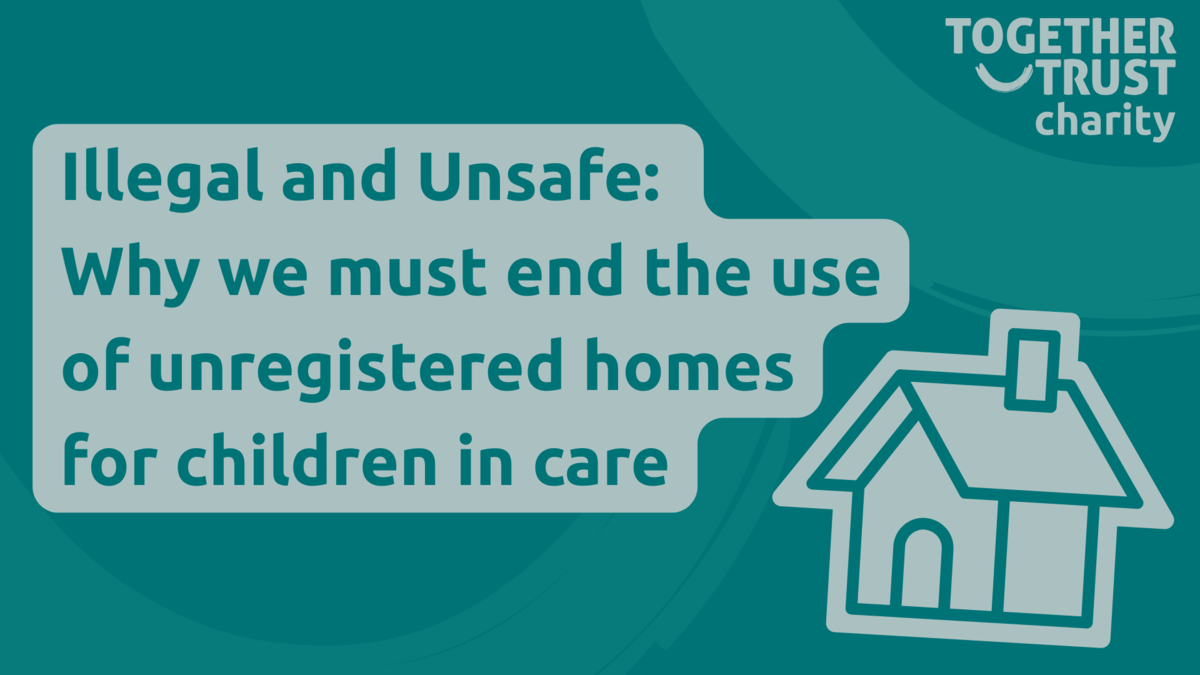
Illegal and Unsafe: Why we must end the use of unregistered homes for children in care
At Together Trust, we are campaigning to end the use of unregistered, illegal settings for children in care. Every child deserves a safe,…
-

Unregistered settings for children in care in the spotlight
Last year, in collaboration with The Observer, we conducted an investigation revealing that over 700 children in the UK are living in unregistered…
-
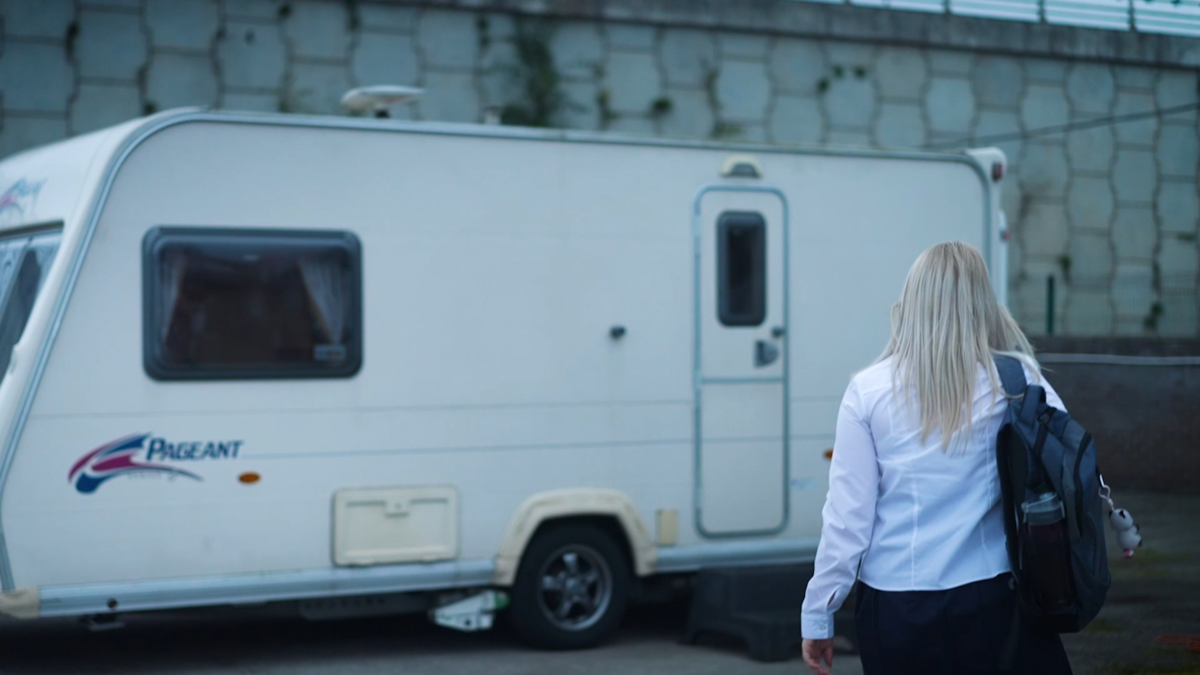
It’s National Care Leavers Week
By Styliana Pasiardi, Campaigns and Advocacy Officer This week – National Care Leavers Week – is an important chance to shine a…
-

Children and young people contribute their experience of the care system in powerful new book
Free Loaves on Friday, an anthology of poems, letters, and other forms of writing written by more than 100 care-experienced people with…
-
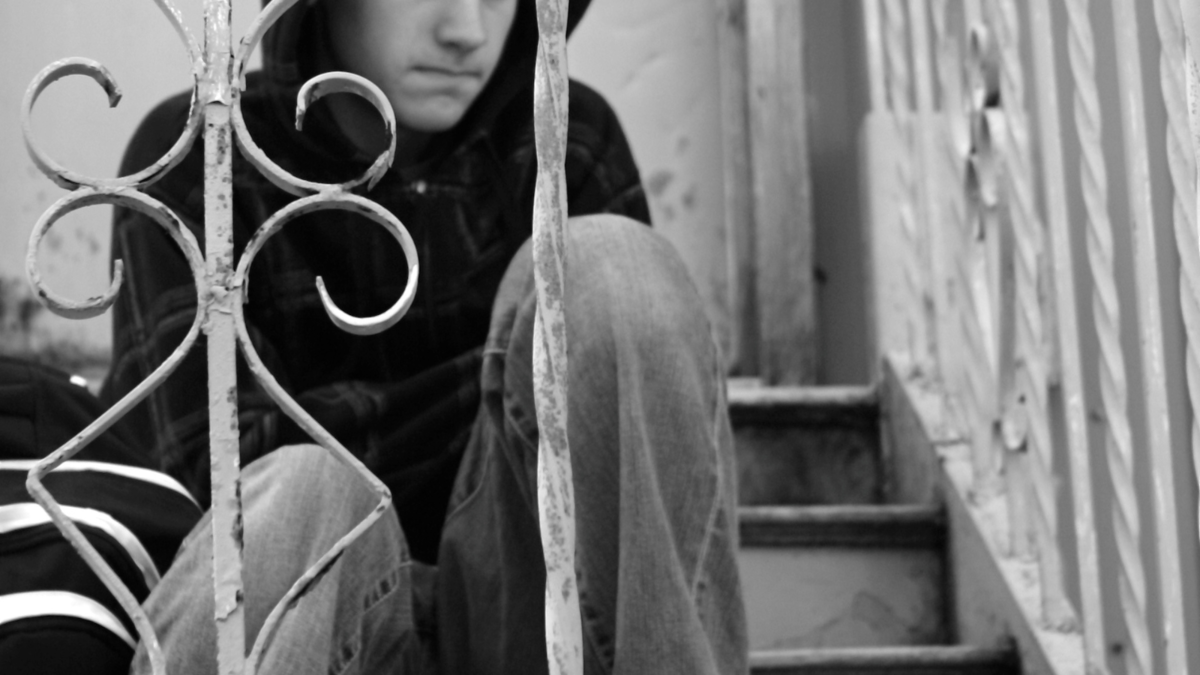
Opinion: Children being placed in illegal children’s homes across the UK is an emerging hidden crisis
15 April 2024 – New data published by the Guardian following a joint investigation by The Observer and Together Trust shows an alarming…



